Varaha Saves Bhoodevi
The
earth-goddess Bhoodevi floated on the sea, warmed by the sun, cooled by the
rain. She always looked towards the sky, her back to the demons, and smiled at
the gods. Feeling slighted, Hiranyaksha, lord of the netherworld, dragged her
down to his infernal kingdom under the sea and sought to make her his queen. To
rescue her, Vishnu turned into Varaha, a gigantic boar. Tail raised, hairs
erect, he plunged into the sea and ripped through the waters until he reached
the ocean floor where he found the earth-goddess in the clutches of the
demon-king. Varaha gored Hiranyaksha to death. Then with a triumphant snort, he
placed Bhoodevi on his mighty tusks and carried her back to the surface of the
sea. Bhoodevi accepted Vishnu as her consort: trees and plants were their
children. Vishnu became the guardian of earth.
Vena's Ingratitude Man and
woman found food, clothing and shelter in the bountiful arms of Bhoodevi and
expressed their gratitude through rituals, yagnas, vratas and pujas. But many
saw no point in thanking the earth. "The earth is man's servant,"
said Vena under whose leadership mankind abandoned all rituals and began
wrenching out the wealth of the earth-goddess
Death
of Vena
 Wise men decried this
ingratitude. They begged Vena and his followers to change their ways.
"Beware the wrath of Vishnu," said the sages. "What Vishnu? Who
is he? Where is he? There is no Vishnu, there is no god. There is only man who
worships himself with offerings of pleasure," said Vena. Unable to tolerate
Vena's callousness, the sages rose in revolt. They cursed and killed Vena.
Wise men decried this
ingratitude. They begged Vena and his followers to change their ways.
"Beware the wrath of Vishnu," said the sages. "What Vishnu? Who
is he? Where is he? There is no Vishnu, there is no god. There is only man who
worships himself with offerings of pleasure," said Vena. Unable to tolerate
Vena's callousness, the sages rose in revolt. They cursed and killed Vena.
Bhoodevi's
Wrath
Despite Vena's death, the
exploitation of earth continued.
Disgusted by the impudence of
man and his insatiable greed Bhoodevi withheld her bounty: seeds did not
sprout, plants did not grow, trees bore no flower or fruit. The earth became
barren.
With no offerings or
sacrifices, even the gods and the demons faced starvation. There was misery in
the three worlds.
Purification
of Vena's Body
Without food, there was despair
and anarchy.
A leader was needed, someone who would make
peace with Bhoodevi and restore order.
Everyone wondered where such a
man could be found. "In Vena himself," informed the sapta-rishis, the
seven celestial seers.
The seers procured Vena's
lifeless body and began rubbing its thigh vigorously till Vena's corrupt nature
emerged from within in the form of a fierce demonic being that was driven into
the darkness.
From the purified corpse the
seers hoped to create the perfect king.
Birth
of Prithu
From the arms of Vena's dead
body, the sapta-rishis drew out a strong and handsome youth called Prithu.
Celestial spirits, gods, demons, birds and beasts gathered around to witness
this unique birth. In Prithu, they saw the spirit of Vishnu. The celestial bow
Sharanga fell from the heavens into Prithu's hand as soon as he was born,
investing him with universal dominion.
Prithu
Chases Bhoodevi
Prithu, the first consecrated
king of mankind, found his subjects hungry and miserable.
Moved by their plight, Prithu
begged Bhoodevi to have pity on them and give them food. She refused. Prithu
threatened the earth-goddess with dire consequences if she did not release her
wealth.
Bhoodevi did not give in.
Instead, taking the form of a cow, she ran away.
Enraged by her defiance, Prithu
mounted his chariot and followed Bhoodevi, pursuing her to the four corners of
the world, determined to subjugate her.
Cowherd
of the Cosmic Cow
Prithu raised his celestial bow
to shoot a deadly missile at the stubborn earth-cow.
"I am the cosmic cow; my
udders nourish life. If you kill me, you will destroy everything that
exists," said Bhoodevi.
"I do not wish to kill
you," explained Prithu. "I only want you to feed mankind."
"Why should I feed those
who abuse me?"
"No one will abuse you
ever again. I will make sure everyone treats you with respect," promised
Prithu. "I will be your guardian, your cowherd, Gopala."
Milking
of the Earth
Prithu taught mankind
agriculture, cattle rearing, mining and trade. He instituted the principle of
prudent economics, artha, that supports human society without harming Nature.
Under Prithu's watchful eye,
the wealth of the earth was milked wisely by man, gods, demons, sages, nagas,
gandharvas, yakshas and every other celestial spirit.
In the earth-cow, mankind found
sustenance, artists found inspiration, scholars found wisdom, priests found
sacred chants, mystics found insights. The devas procured energising potions,
the asuras obtained intoxicating drinks. Gandharvas found music, apsaras found
beauty, vidyadharas found magic. Cattle got grass snakes got venom bees got
honey.
Bhoodevi satisfied everyone's
needs. She was worshipped and adored by all as Prithvi: the beloved of Prithu.
Bhoodevi's
Fear
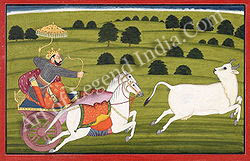 The three worlds thanked Vishnu
for making peace with Bhoodevi.
The three worlds thanked Vishnu
for making peace with Bhoodevi.
But there was fear in the heart
of the earth-goddess. "What if there is another Vena in the future?"
she asked the lord.
"Fear not," said Vishnu.
"I will institute dharma: laws that will guarantee your well being.
Whenever these laws are broken I will descend upon earth to punish the
transgressor."
Bull
of Dharma
From Vishnu's chest rose a bull. "Behold,
the bull of dharma. Love, truth, discipline and compassion are its four limbs.
So long as it stands upright, the world will survive," said the lord.
Brahma revealed, "Every
time this bull of dharma loses a leg, an age will come to an end. The first age
to come to an end will be the age of perfection, Krita-yuga. After this will
come Treta and Dvapara yugas, periods of increasing corruption. Finally, when
the bull stands on only one foot it will be the age of Kali, the age of
materialism and spiritual blindness, at the end of which the floods of doom
will engulf the earth."
Birth
of Mandhata
In Krita-yuga, Vishnu descended
upon earth as Mandhata, to teach mankind the ways of dharma.
Yuvanashva, king of the world,
had many wives but no children. So the sages of earth gave him a pot of holy
water, potent enough to give anyone a child. "Keep the pot under your bed
for one night; at dawn let your favourite queen drink the water," said the
sages.
The king kept the pot of water
under his bed as he was told. But in the middle of the night, he woke up
feeling thirsty and accidentally drank the sacred water.
As a result he became pregnant.
Nine months later, Yuvanashva
experienced the pangs of labour. The gods descended from the heavens to deliver
the child. They cut open the king's side and pulled it out.
"How will I, a man, nurse
this child?" wondered Yuvanashva.
"I will feed it,"
said Indra, king of the gods, placing his divine finger that oozed milk in the
child's mouth.
This child, born of a man,
nursed by a god, was Mandhata — the best of kings.
Duties
of Man
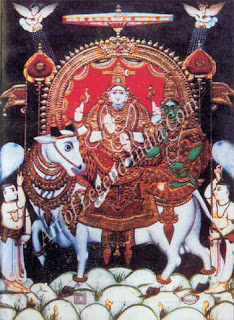 Mandhata defined the duties of
every member of society based on dharma: brahmanas looked after the spiritual
and intellectual needs of society; kshatriyas took care of its defence and
administration; vaishyas ensured its material welfare; shudras through service
and skill, supported its very foundations. No group, varna, dominated the
world.
Mandhata defined the duties of
every member of society based on dharma: brahmanas looked after the spiritual
and intellectual needs of society; kshatriyas took care of its defence and
administration; vaishyas ensured its material welfare; shudras through service
and skill, supported its very foundations. No group, varna, dominated the
world.
Said Mandhata, "Without
dharma, etonomics and politics is corrupt, pleasure is vulgar, and the quest
for salvation, escapism."
During Mandhata's reign every
man performed his duty. Mankind respected the laws of society and the cycles of
Nature to live in harmony with the world around.
It was a golden age.
Mandhata's
Penance
Mandhata's virtue inspired the
people of earth to lead virtuous lives filled with love, truth, discipline and
compassion. Man's virtue pleased the gods who sprinkled rain and made the earth
fertile.
One year the rains did not
come. Indra, lord of the celestial realm, told Mandhata, "Someone in your
land is not respecting dharma. I will let the rains fall only if you kill the
culprit."
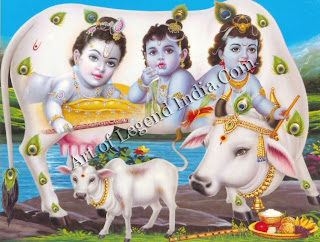 Mandhata refused to kill
anyone. He said, "If one of my subjects is breaking the sacred law, it
means that I, as king, have failed in my duty."
Mandhata refused to kill
anyone. He said, "If one of my subjects is breaking the sacred law, it
means that I, as king, have failed in my duty."
Mandhata punished himself: he
fasted, walked on fire, slept on ice. Watching Mandhata suffer for their sake,
those who had broken the sacred laws mended their ways.
Indra let the rains fall on
earth.
Stages
of Life
Having completed his duties as
king and householder, Mandhata decided to renounce the world. "As part of
samsara, I have fulfilled all my obligations. I have made good use of wealth
and power and have enjoyed all the pleasures of life. Now, it is time to go
beyond these material things. I seek moksha."
"Why now?" asked his
people.
"In the first part of my
life, as a bra hmachari, I prepared myself to live in this world; then I became
a grihast hi, a householder and a responsible member of society. Now it is time
to become a vanaprasthi, a forest-dweller, renounce the world to make way for
the next generation. Only then can I become a sanyasi, free to liberate the
spirit from the confines of the body, the limitations of the mind and the
domination of the ego."
After crowning a worthy
successor, Mandhata abandoned all contact with human society and returned
whence he had come — to the heart of Vishnu.
Writer –Devdutt Pattanaik
 Wise men decried this
ingratitude. They begged Vena and his followers to change their ways.
"Beware the wrath of Vishnu," said the sages. "What Vishnu? Who
is he? Where is he? There is no Vishnu, there is no god. There is only man who
worships himself with offerings of pleasure," said Vena. Unable to tolerate
Vena's callousness, the sages rose in revolt. They cursed and killed Vena.
Wise men decried this
ingratitude. They begged Vena and his followers to change their ways.
"Beware the wrath of Vishnu," said the sages. "What Vishnu? Who
is he? Where is he? There is no Vishnu, there is no god. There is only man who
worships himself with offerings of pleasure," said Vena. Unable to tolerate
Vena's callousness, the sages rose in revolt. They cursed and killed Vena.  Mandhata defined the duties of
every member of society based on dharma: brahmanas looked after the spiritual
and intellectual needs of society; kshatriyas took care of its defence and
administration; vaishyas ensured its material welfare; shudras through service
and skill, supported its very foundations. No group, varna, dominated the
world.
Mandhata defined the duties of
every member of society based on dharma: brahmanas looked after the spiritual
and intellectual needs of society; kshatriyas took care of its defence and
administration; vaishyas ensured its material welfare; shudras through service
and skill, supported its very foundations. No group, varna, dominated the
world.  Mandhata refused to kill
anyone. He said, "If one of my subjects is breaking the sacred law, it
means that I, as king, have failed in my duty."
Mandhata refused to kill
anyone. He said, "If one of my subjects is breaking the sacred law, it
means that I, as king, have failed in my duty." 

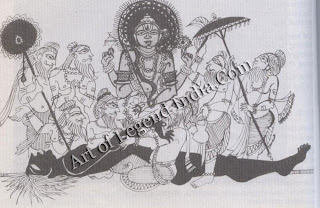
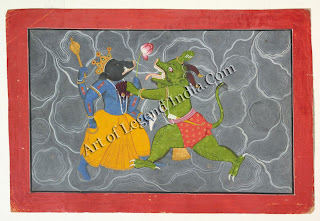











0 Response to "Vishnu Establishes the Law "
Post a Comment